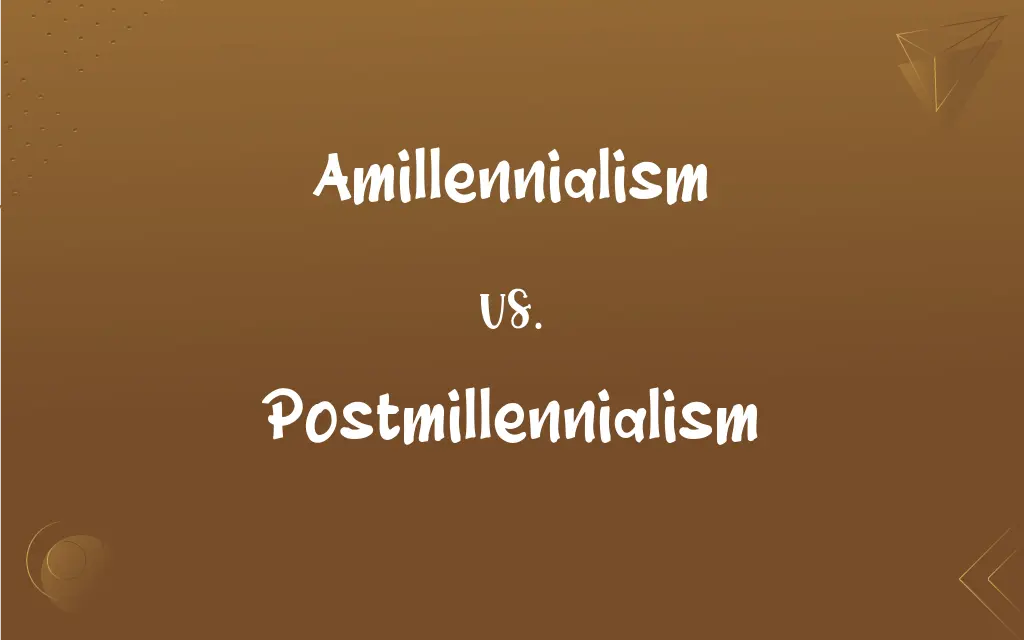Amillennialism vs. Postmillennialism: What's the Difference?
By Janet White || Updated on May 22, 2024
Amillennialism denies a literal thousand-year reign of Christ on Earth, viewing it as symbolic of the current church age, while Postmillennialism believes Christ will return after a thousand-year period of Christian prosperity and dominance.

Key Differences
Amillennialism interprets the millennium described in Revelation 20 as a symbolic period representing the current church age. Amillennialists believe Christ's reign is already occurring in heaven and through the church on Earth. Postmillennialism, on the other hand, anticipates a future golden age of Christian dominance on Earth before Christ's second coming. Postmillennialists interpret the millennium as a literal or extended period during which Christianity will flourish and bring widespread peace and righteousness.
In Amillennialism, there is no expectation of a distinct future millennial kingdom on Earth. Amillennialists hold that Christ's kingdom is spiritual and presently active in the world. This belief contrasts with Postmillennialism, which expects a transformative era of Christianity's influence leading up to the second coming.
Amillennialism often views the world as progressively corrupted until Christ's return, rejecting the idea of a future utopian age on Earth. In contrast, Postmillennialism is more optimistic about the transformative power of the gospel, anticipating a gradual improvement of the world through Christian influence.
Both Amillennialism and Postmillennialism share a belief in Christ's return and final judgment but differ significantly in their expectations of the events preceding it. Amillennialism sees no distinct future millennium, while Postmillennialism expects a future period of Christian prosperity and peace.
Comparison Chart
Millennium Interpretation
Symbolic of the current church age
Literal or extended future period of Christian dominance
ADVERTISEMENT
Christ's Reign
Presently in heaven and through the church
Future earthly reign after a period of Christian prosperity
Worldview
Pessimistic about worldly improvement until Christ's return
Optimistic about gradual improvement through the gospel
Future Expectations
No distinct future millennium kingdom on Earth
Expect a golden age before Christ's second coming
Focus
Spiritual reign and current church age
Future transformative Christian influence
Amillennialism and Postmillennialism Definitions
Amillennialism
Perspective that the millennium is the current church age.
Amillennialism views the church age as the symbolic millennium.
ADVERTISEMENT
Postmillennialism
Belief in a future golden age before Christ's return.
Postmillennialism expects a period of Christian prosperity before the end.
Amillennialism
View that there will be no future earthly millennial kingdom.
Amillennialism rejects a future literal millennium on Earth.
Postmillennialism
View that Christ will return after a thousand-year reign of peace.
Postmillennialism holds that Christ's return follows a golden age.
Amillennialism
Interpretation that the thousand years in Revelation are not literal.
In Amillennialism, the thousand years signify completeness, not a literal timeframe.
Postmillennialism
Expectation of Christianity's gradual dominance in the world.
Postmillennialism predicts the gospel will transform societies over time.
Amillennialism
Denial of a literal thousand-year reign of Christ.
Amillennialism interprets the millennium symbolically.
Postmillennialism
Optimistic outlook on the future impact of Christianity.
Postmillennialism believes the world will improve through Christian influence.
Amillennialism
Belief that Christ's reign is spiritual and ongoing.
According to Amillennialism, Christ currently reigns through the church.
Postmillennialism
Interpretation of the millennium as a future era of Christian influence.
Postmillennialism sees the millennium as a period of global righteousness.
Amillennialism
(Christianity) A view in Christian eschatology that rejects the claimed future thousand-year physical reign of Jesus Christ on the earth, in opposition to premillennial and some postmillennial views of the Book of Revelation, chapter 20, claiming instead that the number of years in Revelation 20 is a symbolic number and that Christ's eventual physical reign will be permanent.
Postmillennialism
The doctrine that Jesus's Second Coming will follow the millennium.
Postmillennialism
(Christianity) An interpretation of the Book of Revelation where Christ's second coming will be after the "Millennium", a Golden Age or era of prosperity and dominance of Christianity.
FAQs
What is Amillennialism?
Amillennialism is the belief that the millennium mentioned in Revelation is symbolic and represents the current church age.
What is Postmillennialism?
Postmillennialism is the belief that Christ will return after a future period of widespread Christian influence and prosperity.
Do Amillennialists believe in a literal thousand-year reign?
No, Amillennialists interpret the thousand years mentioned in Revelation as symbolic.
How do Amillennialists view Christ's reign?
Amillennialists believe Christ's reign is currently happening in heaven and through the church.
Is the millennium a present reality in Amillennialism?
Yes, Amillennialists believe the millennium is the current church age.
Do Postmillennialists expect a future utopian age?
Postmillennialists expect a future golden age of Christian influence and peace.
How do Amillennialists interpret Revelation 20?
Amillennialists interpret Revelation 20 symbolically, not as a literal future event.
Is the millennium a future reality in Postmillennialism?
Yes, Postmillennialists believe the millennium is a future period of Christian prosperity.
What is the worldview of Amillennialism regarding the future?
Amillennialism generally holds a pessimistic view of worldly improvement until Christ's return.
Do Postmillennialists believe in a future golden age?
Yes, Postmillennialists expect a future era of Christian dominance and peace before Christ's return.
How do Postmillennialists view the millennium?
Postmillennialists view the millennium as a literal or extended future period of Christian influence.
What is the worldview of Postmillennialism regarding the future?
Postmillennialism holds an optimistic view, expecting gradual improvement through the gospel.
Do Postmillennialists believe in a distinct future millennium?
Yes, Postmillennialists believe in a future period of Christian prosperity before Christ's return.
What is the nature of Christ's kingdom in Amillennialism?
In Amillennialism, Christ's kingdom is spiritual and currently active in the world.
What is the focus of Postmillennialism?
Postmillennialism focuses on the future transformative influence of Christianity.
Do Amillennialists believe in a distinct future millennium?
No, Amillennialists do not believe in a distinct future millennium on Earth.
Do Amillennialists expect a future utopian age?
No, Amillennialists do not expect a future utopian age on Earth.
What is the focus of Amillennialism?
Amillennialism focuses on the spiritual reign of Christ and the current church age.
How do Postmillennialists interpret Revelation 20?
Postmillennialists interpret Revelation 20 as a future period of Christian dominance.
What is the nature of Christ's kingdom in Postmillennialism?
In Postmillennialism, Christ's kingdom will manifest as a future earthly reign following a period of Christian dominance.
About Author
Written by
Janet WhiteJanet White has been an esteemed writer and blogger for Difference Wiki. Holding a Master's degree in Science and Medical Journalism from the prestigious Boston University, she has consistently demonstrated her expertise and passion for her field. When she's not immersed in her work, Janet relishes her time exercising, delving into a good book, and cherishing moments with friends and family.































































